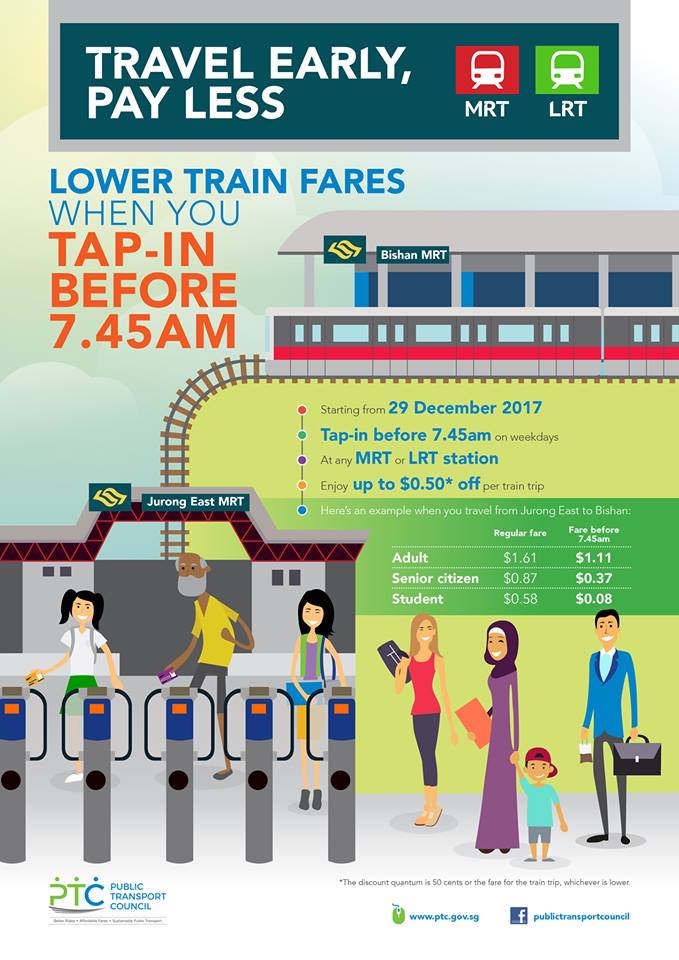Lower Morning Pre-Peak Rail Fares Islandwide

The Public Transport Council (PTC) has concluded the 2017 Fare Review Exercise. With the roll-over quantum of -1.5% from the 2016 Fare Review Exercise, the fare adjustment quantum to be considered for this year’s exercise is -5.4%. In parallel with the Fare Review Exercise, PTC has also reviewed the Free Pre-Peak Travel (FPPT) and Off-Peak Pass (OPP) trials. PTC has decided to: a. Lower the rail fares for morning pre-peak travel by up to 50 cents, amounting to a fare adjustment quantum of -2.2%; and b. Roll-over the remaining -3.2% of the fare adjustment quantum to the next Fare Review Exercise.
2. The above will take effect on 29 December 2017.
Lower Morning Pre-Peak Card Fares across Rail Network
3. PTC supports the objective of encouraging off-peak travel through differentiated fares, as commuters can benefit from more comfortable, less crowded rides, while public transport resources can be utilised more efficiently.
This is evidenced in other major cities like London and Sydney, which also use differentiated fares. 4. Having reviewed the efficacy of the FPPT and OPP trials in incentivising travel outside of the peak-period windows, PTC found that discounted fares during the morning pre-peak hours have been effective in encouraging rail commuters to travel off-peak, therefore lowering peak travel demand. Since FPPT was introduced in June 2013, there has been a sustained 7% shift of rail trips out of the morning peak hours, even as rail ridership continued to grow over the same period. The Off-Peak Pass trial, on the other hand, has shifted less than 200 rail users to off-peak travel.
5. To encourage even more commuters to travel before the morning peak hours, PTC will introduce lower morning pre-peak card fares across the entire rail network. This will widen the catchment from that of the FPPT trial which is limited to exiting from 18 MRT stations within the city centre only. Commuters who tap in with their fare cards at any rail station before 7.45am on weekdays (excluding public holidays) will enjoy fares that are up to 50 cents lower. 1 PTC will monitor travel patterns and enhance the scheme from time to time. Rail fares outside the eligible timing and bus fares will be unchanged for this Fare Review Exercise.
6. PTC Chairman, Mr Richard Magnus said, “About 300,000 rail commuters already travel before the morning peak and stand to benefit from lower fares. We hope that the lower morning pre-peak fares will encourage more rail commuters to make the shift to morning pre-peak travel. They can enjoy a more comfortable ride while paying lower fares! Spreading out travel demand in this way will also make more efficient use of our public transport system, as capacity during off-peak periods will be better utilised.”
Recommendation for Cessation of Free Pre-Peak Travel and Off-Peak Pass
7. With the introduction of lower morning pre-peak card fares across the rail network, PTC recommends streamlining existing schemes that encourage offpeak travel by ceasing the FPPT and OPP trials.
Ensuring a Sustainable Fare System for All
8. With a fare adjustment quantum of -2.2% utilised to introduce lower morning pre-peak card fares across the entire rail network, the remaining -3.2% of the fare adjustment quantum will be carried forward to the next Fare Review Exercise.
9. In making this recommendation, PTC is mindful that fares are affordable. In fact, household income increases have consistently outpaced changes in public transport expenditure over the past decade, as shown through the Public Transport Fare Affordability Indicator, which tracks fare affordability.2 The percentage of monthly household incomes spent on public transport has decreased from 3.1% in 2006 to 2.1% in 2016 for second quintile households, and from 4.4% in 2006 to 2.9% in 2016 for second decile households.
10. PTC also recognised the rising cost pressures that came along as the public transport industry pushed to deliver higher service standards. Over the next five years, the government expects to provide $4 billion in subsidies to public bus services. Over the same period, another $4 billion will be spent renewing, upgrading and expanding rail operating assets. This is on top of the $20 billion that will be pumped in to build new public transport infrastructure.
Annex A: Examples of Lower Morning Pre-Peak Rail Fares
Annex B: Factsheet for 2017 Fare Review Exercise
Annex C: Approved Bus and Train Fares
